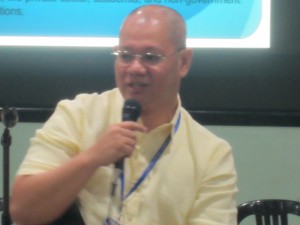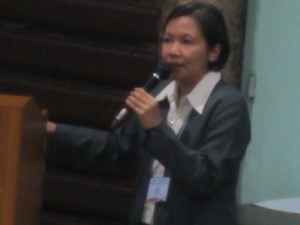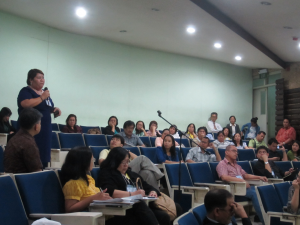NGAs Push for Interoperability for Transparency
February 16, 2012 7:24 pm | by Aliyah Lou Evangelista | Posted in News

“Interoperability is no longer a requirement but a need already,” sayd Richard E. Moya, Under Secretary/Chief Information Officer of the Department of Budget and Management (DBM) after explaining that data on actual figures of the country’s land area is in debate amongst different
“Interoperability is no longer a requirement but a need already.”
This was said by Department of Budget and Management (DBM) Undersecretary/Chief Information Officer (CIO) Richard E. Moya during the Government Interoperability Forum, held at the National Computer Center (NCC) last February 16.
Sixty-four representatives from 16 national government agencies agreed that data sharing within government information systems is key to transparent and efficient delivery of government services.
In the consultative forum, different agencies discussed how they can better access reports and data from different departments without going through complex bureaucratic processes. The government agencies complained that vital reports for national projects and interventions are often unavailable. Untimely submission of reports, inaccuracy of data collected at the ground level, and lack of access to government databases have caused delays and recurring problems in the implementation of different government programs across the country.
“You cannot have a good government without access to complete data,” said Moya, after sharing that DBM had problems in counter checking government projects due to the lack of reliable statistics.
As part of the efforts geared toward a convergent Philippine government system, interoperability of government information systems will be able to facilitate data exchange among different government agencies. This will provide concerned authorities a common virtual platform that will give them immediate access to needed data. It will not just simplify data exchange but will also speed up government processes for citizens.

Julie Ana E. Sudario, Managing Director of Department of Science and Technology-NCC, discusses the Philippine Government Interoperability Framework (PGIF)
“A person applying for passport may not have to go to NSO, NBI, and POEA, just to get his documents since DFA can access these databases when interoperability happens,” explained Julie Ana E. Sudario, Managing Director of Department of Science and Technology-NCC during the presentation of the Philippine Government Interoperability Framework (PGIF). PGIF is an initiative started by NCC 9 years ago but has not yet been pushed through.
Interoperability will also be able to promote transparency and accountability since transactions will be mechanized.
Efforts on interoperability of systems have been in existence since last year with the Department of Social Welfare and Development (DSWD) coordinating with the Department of Agriculture (DA) to get figures on the country’s land distribution for the National Household Targeting Survey (NHTS).
To make interoperability work, different government agencies must agree on a common data dictionary that will be used as the language for different government databases to communicate with each other. National Statistical Coordination Board Director Jessa Encarnacion offered the NSCB data dictionary that they have as the common language for interoperability.
Moya also shared that preparations for a national program usually takes about five years, but if all government agencies will join hands in pushing it forth, interoperability should already be operational within two months.
But, the major issue that was raised in the meeting was the question on which government agency will champion this initiative. As of press time, the National Telehealth Center (NTHC) of the University of the Philippines (UP) Manila organized the forum as an offspring of one of its projects on monitoring of key maternal and child health indicators using the Community Health Information Tracking System (CHITS).
It was also emphasized that policies are also needed to sustain interoperability among different government agencies.

Director Jessa Encarnacion offering the NSCB data dictionary to be used as common language for the interoperability initiative
The forum was headed by NTHC of UP Manila in coordination with NCC, United Nations Children’s Fund (UNICEF) and National Anti-Poverty Commission (NAPC).
The Department of Health (DOH), National Statistics Coordinating Board (NSCB), Philippine Council for Health Research and Development (PCHRD), National Economic Development Authority (NEDA), Commission on Population (PopCom), Philippine Health Insurance System (PhilHealth), Department of Science and Technology (DOST), Department of Education (DepEd), Development Academy of the Philippines (DAP), United Nations Children’s Fund (UNICEF), Smart Communications also participated in the said forum.